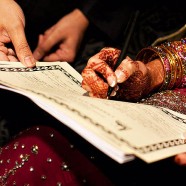
Mehr / Mahr / Meher [pronunciation: - Meh – er]:
Meaning of Mehr in our society: To fix an idealistically large amount and then not paying it or not able to pay it or paying a ridiculously small amount, of which one cannot benefit from.
Meaning of Mehr in Islam: It is a gift, given in the form of money or possession, by the groom to his bride at the time of marriage. This is mainly for the bride’s security and for her purpose solely.
In our society, many things – concepts have changed overtime. Religion is being mixed with the preferences of our society. We follow those things which are in favour of ours or we translate it into the manner that is undemanding for us to pursue.
What exactly is Mehr?
‘And give the women (on marriage) their mehr as a free gift; but if they of their own good pleasure remit any part of it to you, take it and enjoy it with right good cheer.’ – (An Nisa, verse 4.)
As stated above, it is a gift in the form of cash or a possession from the groom to his bride, a gesture of love and appreciation. In Islam, Mehr is fardh (obligatory), that it remains a debt on you if you decide not to pay it. It is mandatory for a husband to pay mehr to his wife unless she expresses the desire not to have it. Words like Sadqah (act of giving out of compassion) and Nihlah (obligatory) have been coined for Mehr.
Why is it obligatory?
Islam has always had a soft corner for women. Thus, Mehr again, is for the protection for them, so that she has a substantial amount to herself in case of any emergencies. Further, in Islam the majority of the financial responsibility lies on the shoulders of a man, that’s why, it shows the commitment of a man to take care of the wife’s financial needs.
When should it be given?
Usually, it is preferred to pay the Mehr during the time of the nikkah. However, researching a bit on this, I came across two types of Mehr – Muajjal and Muwajjal.
Muajjal – is where you have to give the complete Mehr before the consummation of marriage.
Muwajjal – is where you have the freedom to pay Mehar after the consummation. Keeping in mind, you are liable to pay for it, until and unless reduced or forgiven by your wife.
How much should be given?
There is no fix amount for Mehr in Shari`ah. It should be reasonable and should be in accordance to the financial status of the man’s family. Keeping in mind, the amount should be mutually discussed with the bride before the marriage.
Mehr after divorce:
Islam safeguards the rights of both the husband and the wife simply by the obligation of Mehr.
If a husband divorces his wife, then it is not lawful for him to take back anything that he gave to his wife.
‘But if ye decide to take one wife in place of another (by giving divorce to the first wife) even if ye had given the latter a whole treasure for dower, take not the least bit of it back.’ (An Nisa- verses 20-21)
If it is the wife who demands a khula (divorce), if the husband wishes, he may demand the mehr, and if he wishes he may take only a part of it or may even forgive it. The decision is completely upon the husband.
This way, if a man decides to divorce his wife, he will bear a financial loss. Alternatively, if a wife decides to divorce her husband she will decide carefully before commencing a divorce.
However, as quoted in Surah Baqarah, verse 237, ‘And if ye divorce them before consummation but after the fixation of Mehr for them, then the half of the Mehr (is due to them), unless they remit it’.
Therefore, it is apparent, Islam doesn’t burden anyone. We, as a society, spend so much on marriage (which is not preferred in Islam) rather we should focus on those things which are obligatory and beneficial for everyone.





Recent Comments